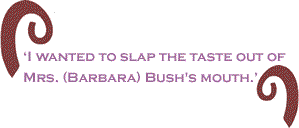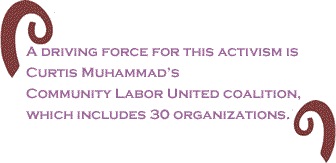
|
|||||||||||||||||||||
|
|
There are 75,000 evacuees from Hurricane Katrina in Arkansas, according to Kathryn Hall-Trujillo. She is the director of the Birthing Project USA, a maternal and child health program nationwide. “On my recent trip with Pastors for Peace to Arkansas I listened in horror, sadness and outrage as people who survived Katrina spoke of their lives before and after the hurricane,” she says. “I wanted to slap the taste out of Mrs. (Barbara) Bush's mouth as she declared they were better off in shelters (like the Houston Astrodome).” With other working people, Hall-Trujillo helped bring and coordinate hurricane aid to evacuees in Arkansas, her birthplace. The airport in Little Rock is a main arrival point for aid, so local folks are well aware of the aid volume arriving at the facility.
A main challenge in distributing Katrina aid to the rural populace is developing relations with grassroots aid providers within the context of the politics of displaced persons. This means dealing with FEMA and the American Red Cross. Can you say ineffective bureaucracies? By contrast in Little Rock, Hall-Trujillo was very impressed with how labor and interfaith folks are cooperating to try and improve people’s living standards. A driving force for this activism is Curtis Muhammad’s Community Labor United coalition, which includes 30 organizations. This is a model of political organizing for other American people to learn from and with.
Plainly, in the context of imperial wars overseas and climate change-caused weather catastrophes stateside, it is high time to rethink the concept of national security. “One of the most patriotic duties we all have right now is to mobilize ourselves and let Congress know that it is genocidal to divert the resources of our country to kill people who are not our enemies both at home and abroad,” Hall-Trujillo says. Seth Sandronsky is a member of Sacramento Area Peace Action and a co-editor with Because People Matter, Sacramento's progressive paper. He can be reached at [email protected]. |
Your comments are always welcome. Visit the Contact Us page to send e-Mail or Feedback or Click here to send e-Mail to [email protected] e-Mail re-print notice
If you send us an e-Mail message we may publish all or part of it, unless you tell us it is not for publication. You may also request that we withhold your name. Thank you very much for your readership. |
| September 29 2005 Issue 152 |
|||||||||
|
|||||||||
|
|
|||||||||
| Printer Friendly Version in PDF format. Download free Adobe Reader. | |||||||||
 |
|||||||||
 |
|||||||||
| |
|||||||||
| |
|||||||||



























